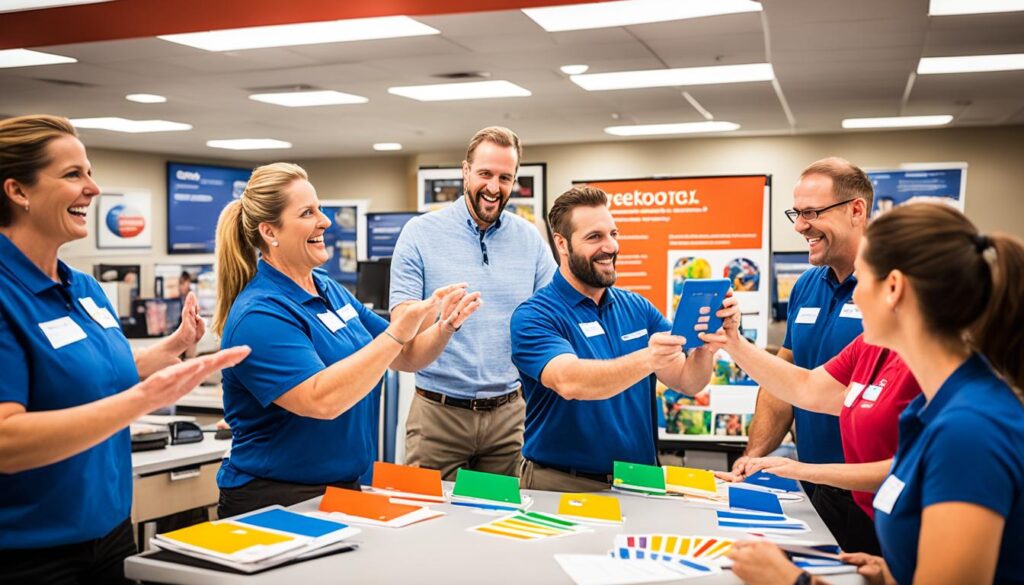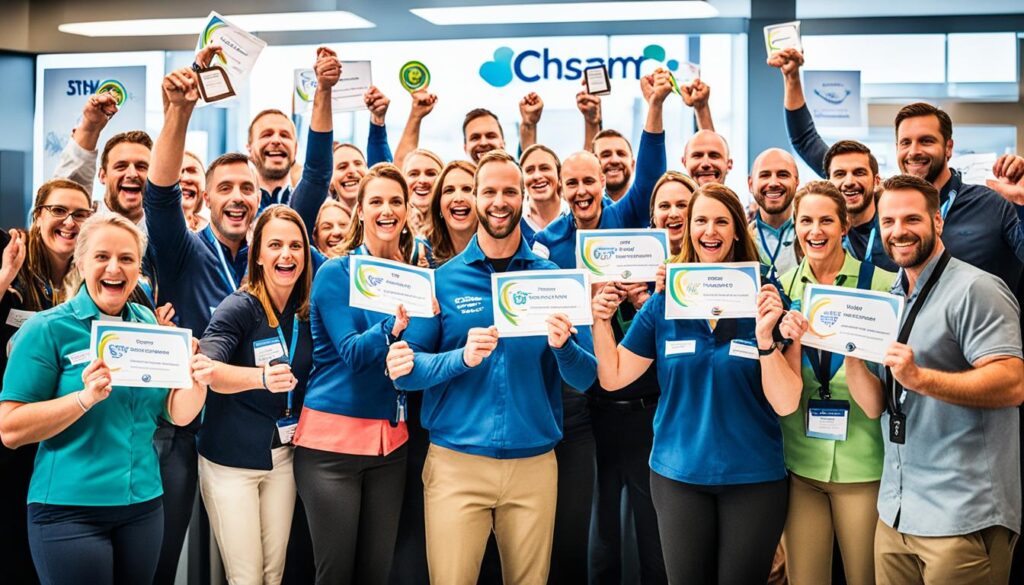Why do some employees go above and beyond to provide exceptional customer service while others fall short? Is it simply a matter of personality or inherent drive? Or is there something more to it? In this article, we will explore the strategies and techniques you can use to motivate your employees to deliver outstanding customer service consistently.
In today’s competitive business landscape, customer service can make or break a company. But how do you ensure that your employees are motivated to provide the level of service that keeps customers coming back?
Join us as we delve into the key factors that drive employee motivation for good customer service. From training and empowerment to using the right metrics and technology, we will uncover the secrets to creating a team-oriented environment that fosters employee engagement and loyalty. By the end, you’ll have the tools and insights to transform your workforce into a customer service powerhouse.
Training and Empowering Employees
Thorough training is crucial for employees to feel confident and capable in their roles. It is important to invest in employee training programs that provide them with the necessary skills and knowledge to excel in their positions. Job-specific training helps employees understand the intricacies of their roles and perform their tasks efficiently.
However, employee training should not be limited to job-specific skills. Providing opportunities for personal and professional growth can also motivate employees and foster a culture of continuous learning. This can include workshops, seminars, online courses, or mentoring programs that help employees develop new skills and expand their knowledge.

Empowering employees is another crucial aspect of motivating them. When employees have the authority to make decisions and resolve customer issues, it boosts their confidence and engagement. Empowered employees feel trusted and valued, which leads to higher job satisfaction and improved customer service. It is important for managers and supervisors to provide clear guidelines and support so that employees feel empowered to take ownership of their work.
Using the Right Metrics and Technology
When it comes to measuring employee success in providing good customer service, using the right metrics is crucial. It’s important to choose metrics that align with both business goals and employee satisfaction. Metrics that prioritize speed over quality or cause unnecessary stress can negatively impact employee morale, which ultimately affects the customer experience.
Implementing technology in customer service can also play a significant role in motivating employees. By streamlining processes and saving time, technology allows employees to focus on higher-level tasks and provide better customer service. This not only improves efficiency but also enhances the overall customer experience, leading to higher customer satisfaction and loyalty.
Benefits of Using Customer Service Metrics:
- Ensure performance aligns with business objectives
- Identify areas for improvement
- Evaluate employee satisfaction and engagement
- Track customer satisfaction and loyalty
Examples of Technology in Customer Service:
- Customer Relationship Management (CRM) software
- Live chat and chatbot platforms
- Knowledge management systems
- Call center automation tools
By utilizing the right customer service metrics and implementing technology effectively, businesses can create a culture of continuous improvement and motivation. This leads to enhanced employee performance and ultimately, better customer service experiences.
Creating a Team-Oriented Environment
Fostering a sense of teamwork and connection among employees is crucial for motivation. This is especially important for remote workforces. Making employees feel like they are part of a team and creating an emotional connection to the company can increase their job satisfaction and loyalty. Managers and supervisors should also take on the role of coaches and mentors to support their employees’ growth and success.
Building Strong Teams
One effective way to create a team-oriented environment is through team building activities. These activities can help employees develop trust, improve communication, and enhance collaboration. Whether it’s a virtual team building exercise or an in-person retreat, these activities play a vital role in strengthening the bonds between team members. They also provide an opportunity for employees to get to know each other on a personal level, leading to better working relationships.

Encouraging Employee Engagement
Employee engagement is key to creating a team-oriented environment. Engaged employees are more likely to be motivated, committed, and productive. To foster employee engagement, companies can promote open communication, encourage feedback and suggestions, and provide opportunities for employees to contribute to decision-making processes. By involving employees in the decision-making process, companies can empower them and make them feel valued, which in turn leads to higher levels of engagement.
Nurturing Emotional Connection
Creating an emotional connection between employees and the company is essential for building a team-oriented environment. This connection can be developed by establishing a positive company culture that aligns with the values and goals of the employees. Regular communication about the company’s mission, vision, and values can help employees feel a sense of purpose and belonging. Recognizing and appreciating employees’ contributions and achievements also fosters a sense of belonging and emotional connection.
Quotes from Experts
“Team building activities provide an opportunity for employees to strengthen their relationships and develop a sense of camaraderie. These activities can improve teamwork, communication, and collaboration, ultimately contributing to a more positive and productive work environment.” – Jane Smith, HR Consultant
“Employee engagement is the key to a successful team-oriented environment. When employees feel engaged and valued, they are more likely to go above and beyond their job responsibilities. This leads to higher levels of teamwork, productivity, and customer satisfaction.” – Mark Johnson, Leadership Coach
| Benefits of a Team-Oriented Environment | Actions to Foster Teamwork | Successful Team Building Activities |
|---|---|---|
| Improved collaboration | Encourage open communication | Virtual escape rooms |
| Higher employee satisfaction | Provide opportunities for feedback | Outdoor team challenges |
| Enhanced creativity and innovation | Involve employees in decision-making | Team cooking classes |
| Increased productivity and efficiency | Recognize and appreciate employee contributions | Board game tournaments |
Recognizing and Appreciating Employees
Recognizing and appreciating employees for their hard work and achievements is a powerful motivator. When you acknowledge employees publicly and provide specific feedback, you create a positive work environment and boost employee morale.
Implementing programs or initiatives that reward and appreciate employees can further motivate them to provide excellent customer service. For example, you can introduce a “customer hero of the month” program, where outstanding employees who go above and beyond in serving customers are recognized and rewarded. This not only boosts employee recognition but also sets a benchmark for others to strive for excellence.
Special incentives can also be used to motivate employees. Consider offering rewards such as gift cards, bonus pay, or extra time-off for exceptional performance. These incentives not only show your appreciation but also provide tangible benefits and act as a stimulus for employees to continuously perform at their best.
Remember, a well-recognized and appreciated employee is a motivated, engaged, and productive employee. By prioritizing employee recognition, appreciation, rewards, and incentives, you not only foster a positive work culture but also drive customer satisfaction and loyalty.

Conclusion
Motivating your employees to provide outstanding customer service is a key factor in improving customer satisfaction and loyalty. By investing in your employees and creating a positive work environment, you can create a team of engaged and motivated individuals who are dedicated to delivering excellent customer experiences.
Training and empowering your employees are fundamental steps to motivate them. Thorough training, both job-specific and personal and professional growth opportunities, will help boost their confidence and competence in serving customers.
Using the right metrics to measure success and implementing technology that streamlines processes can also motivate employees by allowing them to focus on higher-level tasks and provide higher-quality customer service. Additionally, fostering a team-oriented environment, whether in the office or with remote workforces, helps employees feel connected and valued, increasing their job satisfaction and emotional connection to the company.
Recognizing and appreciating your employees’ hard work and achievements is a powerful motivator. By implementing programs or initiatives that reward and appreciate employees, you can create a positive work environment, boost morale, and inspire them to provide excellent customer service consistently.
In summary, by combining training, empowerment, measurement, technology, team-building, and recognition, you can motivate your employees to go above and beyond in delivering exceptional customer service. Ultimately, this investment in your employees will lead to improved customer satisfaction, loyalty, and overall business success.
FAQ
How can I motivate my employees to provide good customer service?
There are several strategies you can implement to motivate your employees for better customer service. These include thorough training, empowering employees to make decisions, using the right metrics to measure success, implementing the right technology, creating a team-oriented environment, and recognizing and appreciating employees for their hard work and achievements.
Why is training important for motivating employees?
Thorough training is crucial for employees to feel confident and capable in their roles. It not only provides them with job-specific skills but also gives them opportunities for personal and professional growth, which can motivate them to provide better customer service.
How can I empower my employees to make decisions?
Empowering employees to make decisions and giving them the authority to resolve customer issues can boost their confidence and engagement. By trusting them with decision-making responsibilities, you show that you have faith in their abilities, which can motivate them to go above and beyond in providing good customer service.
What metrics should I use to measure employee success?
It is important to use metrics that align with both business goals and employee satisfaction. Avoiding metrics that cause unnecessary stress or focus solely on speed can help maintain employee morale. Instead, consider metrics that measure the quality of customer interactions and the overall customer experience.
How can technology help in motivating employees for better customer service?
Implementing technology that streamlines processes and saves time can motivate employees by allowing them to focus on higher-level tasks and provide better customer service. By automating repetitive and mundane tasks, employees can dedicate more time and energy to providing excellent customer service.
How can I create a team-oriented environment?
Fostering a sense of teamwork and connection among employees is crucial for motivation. This can be especially important for remote workforces. Making employees feel like they are part of a team and creating an emotional connection to the company can increase their job satisfaction and loyalty.
Why is recognizing and appreciating employees important?
Recognizing and appreciating employees for their hard work and achievements is a powerful motivator. Providing specific feedback and acknowledging employees publicly helps create a positive work environment and boosts employee morale. Implementing programs or initiatives that reward and appreciate employees can further motivate them to provide excellent customer service.
Source Links
- https://www.forbes.com/sites/shephyken/2023/02/15/ten-ways-to-motivate-employees-to-deliver-the-best-customer-service-experience/
- https://www.freshworks.com/live-chat-software/live-chat-support/how-to-motivate-your-customer-support-employees-blog/
- https://www.revechat.com/blog/motivate-customer-service-team/
